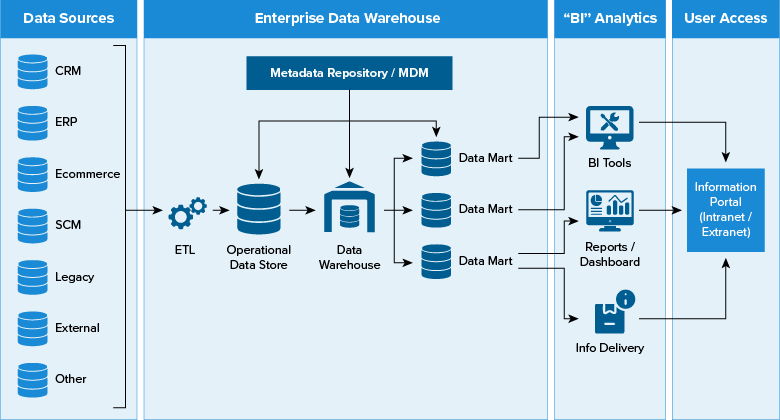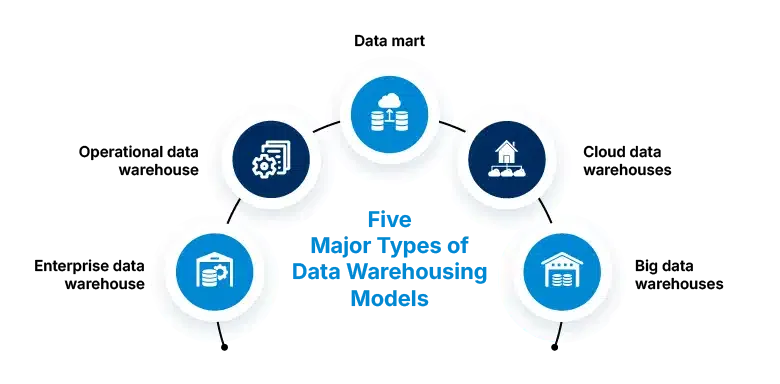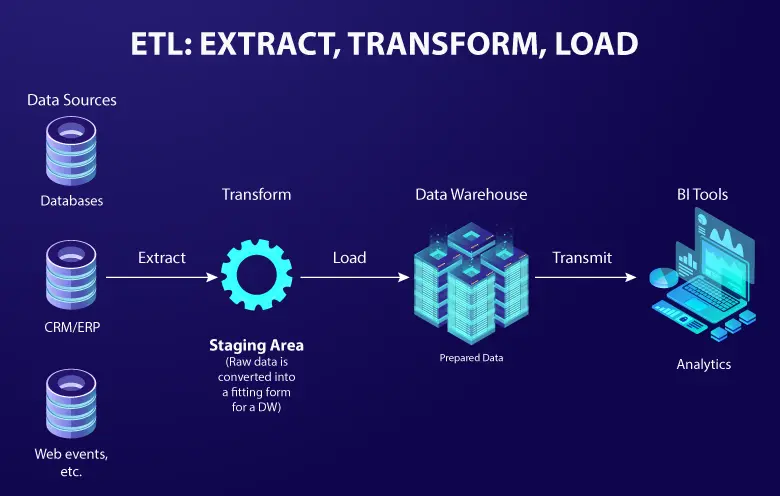Data warehouses have been a staple of the data architecture for decades. They provide organizations with a central repository for storing and analyzing large amounts of data. In recent years, the landscape of data warehousing has changed significantly. This is due to the advent of big data, cloud computing, and new technologies such as data lakes and data warehouses in the cloud.
A data warehouse is a centralized repository for storing and managing large amounts of structured data, designed for fast query performance and business intelligence workloads. A data lake is a central repository that stores structured, semi-structured and unstructured data at any scale. We have listed 6 key differences between data warehouse and data lake for better understanding.
In this blog, we’ll take a deep dive into the world of modern data warehouse architecture. We’ll explore its different types, the key technologies driving their development, and best practices for implementing and managing a data warehouse in today’s fast-paced, data-driven world.
What is a data warehouse?
Data warehouse is designed to handle high volumes of data and support complex queries and analysis. This makes them an essential tool for businesses looking to gain insights from their data. They are typically designed to support data from multiple sources, including:
- Transactional databases
- Log files
- External data sources such as social media and web analytics
Data is typically structured and stored in a way that makes it easy to query and analyze, using technologies such as SQL and business intelligence tools.
Before moving on with an in-depth understanding of data warehouse, you might want to read our detailed blog on ETL vs. ELT to understand different data pipeline approaches.
Architecture of modern data warehouse
At the heart of a modern data warehouse lies an integrated, structured, and purpose-built architecture that mirrors the rising complexity of enterprise data environments. It begins with a diverse mix of data sources – CRM, ERP, eCommerce, supply chain, and even legacy systems – each producing critical, yet siloed, data streams.
These streams converge through an ETL process designed to extract, cleanse, and contextualize data for downstream use. The Operational Data Store (ODS) acts as a real-time staging layer, supporting near-instant insights before data is curated into the central warehouse. Governed by metadata repositories and master data management (MDM), this central warehouse ensures consistency, traceability, and governance across the enterprise.
From here, data flows into specialized data marts that serve distinct business domains – marketing, finance, operations – enabling targeted analysis. Business intelligence tools then tap into these marts to generate dashboards, automated reports, and guided insights tailored to user roles.
Finally, through a secured portal – whether intranet or extranet – this information becomes accessible to decision-makers in a format they can act on immediately. What makes this architecture resilient is its modularity and alignment with how decisions are made: fast, specific, and at scale.
Types of data warehouses
There are several types; each designed to meet the specific needs of different organizations. The most common types of data warehouses include:
1. Enterprise data warehouses: These are large-scale data warehouses that support the data needs of an entire organization. They are typically designed to handle high volumes of data and support complex queries and analysis.
The enterprise data warehouse market is expected to grow at a CAGR of 20.42% during 2022-2026. – Technavio
2. Data marts: Subset of data warehouse, a data mart is tailored to meet the unique needs of a particular segment of a business.
3. Operational data stores: Operational data stores (ODS) are used to support real-time operations and decision-making. They are designed to support high volumes of fast-changing data. They are typically used to store data from transactional systems such as point-of-sale systems or supply chain management systems.
4. Cloud data warehouses: Cloud data warehouses are hosted in the cloud, rather than on-premises. They offer many of the same features as traditional ones, but with the added benefits of flexibility, scalability and reduced infrastructure costs.
Our Modern data warehouse platforms
The modern data warehouse goes beyond a static repository. Whether you want to enable predictive models, support real-time dashboards, or streamline cross-functional collaboration – the right data platform can fulfill such needs. Let’s look at some modern data warehouse platforms and learn about their uniqueness.
Snowflake
It has redefined expectations around simplicity and scale. Its architecture decouples compute from storage, allowing companies to size resources for specific workloads rather than overbuild infrastructure. Features like data sharing across accounts and time travel provide analytical flexibility without introducing risk. For fast-moving organizations experimenting with models, metrics, and microservices, Snowflake is a warehouse and a platform for iterative decision-making.
Amazon Redshift
It sits at the core of AWS’s data ecosystem, and that positioning is its biggest strength. It enables organizations to bring analytics to the data rather than move data to analytics. Redshift Spectrum extends querying capabilities into Amazon S3 without data duplication, reducing latency in hybrid storage environments. For firms already embedded in AWS, Redshift becomes less of a choice and more of a natural extension – one that connects seamlessly with services from streaming (Kinesis) to ML (SageMaker), making it a bridge between raw data and operational intelligence.
Google BigQuery
Google BigQuery eliminates infrastructure management by offering a serverless model that frees teams to focus entirely on insights. It supports SQL at a massive scale, but also provides native integrations with Looker and Vertex AI, enabling end-to-end pipelines from queries to machine learning to visualization. More than a warehouse, BigQuery positions itself as a thinking tool where the cost of asking complex questions is not complexity itself, but curiosity and clarity. That shift from managing clusters to exploring hypotheses resonates with organizations seeking speed over control.
Azure Synapse Analytics
It brings together structured data warehousing and big data processing in one analytical fabric. The platform’s integration with Power BI and Azure Machine Learning means teams can move from ETL to visualization to modeling in a single environment. Synapse speaks fluently to both data engineers and business analysts, enabling collaborative analytics without introducing silos. Thus, it offers a competitive advantage for enterprises already within Microsoft’s orbit.
Teradata Vantage
Teradata Vantage combines the maturity of a decades-old platform with the agility to support multi-cloud deployments and multi-language analytics. Whether using SQL, Python, or R, teams can analyze complex workloads at scale without sacrificing governance. Vantage’s hybrid architecture appeals to global enterprises that need consistency across geographies and flexibility to adapt.
Key technologies in modern data warehousing
The world of data warehousing is constantly evolving with more advanced technologies and approaches emerging all the time. Here are some of the key technologies that are driving the development of modern data warehouses:
Big data:
The explosion of big data has led to the development of cutting-edge technologies and approaches for storing, processing and analyzing large data sets. Technologies such as Hadoop and Spark have made it possible to handle the volume and variety of data generated by modern businesses.
Cloud computing:
Cloud computing has revolutionized data warehouse implementation and management. Cloud data warehouses offer many benefits, including reduced infrastructure costs, scalability and flexibility.
Real-time analytics:
The increasing need for real-time decision-making has led to the development of technologies that support real-time analytics.
Implementing and managing a data warehouse can be a complex and time-consuming process. However, by following best practices, organizations can ensure that they are effective, efficient and aligned with business needs.
What are the features and benefits of a modern data architecture
Scalability
As organizations collect and generate more data, a data warehouse can scale up or down as needed to meet changing data needs. This may involve adding extra storage and computing resources to support larger data volumes or being able to scale down to reduce costs when data needs are low.
Performance
Modern data warehouses are optimized for fast query and analysis performance, enabling organizations to get insights from their data quickly. This may involve using technologies such as columnar storage, in-memory processing, and data indexing to enable faster querying and analysis.
Flexibility
They support a wide range of data types and formats from multiple sources. This enables organizations to get a more complete view of their data and gain deeper insights.
Security
Robust security features protect the confidentiality and integrity of data. This may include encryption of data, evaluate controls to prevent unauthorized access and monitoring as well as alerting to detect and prevent security breaches.
Data governance
Modern data warehouses have robust data governance policies and procedures in place to ensure the accuracy and quality of the data. This ensures that the data in the data warehouse is reliable and consistent.
Cloud support
Companies can gain benefits like scalability, flexibility and reduced infrastructure costs. Businesses can provision additional storage and computing resources quickly and easily as needed. They can also take advantage of the latest data warehousing technologies without the need to purchase and maintain expensive on-premises hardware.
Advanced analytics
Advanced analytics techniques such as machine learning and predictive modeling enable organizations to gain deeper insights from their data and make more informed decisions.
Improved business insights
Store, integrate and analyze large amounts of data from multiple sources. This provides a complete view of the business, enabling better decision-making.
Enhanced performance
Modern data warehouses are optimized for fast query and analysis performance, enabling organizations to get insights from their data quickly and efficiently.
Greater flexibility
Data warehouses support a wide range of data types and formats. They can integrate data from multiple sources, providing greater flexibility. This enables organizations to adapt to changing data needs.
Reduced infrastructure costs
Cloud-based data warehouses can reduce infrastructure costs by eliminating the need to purchase and maintain expensive on-premises hardware.
Improved data quality
They ensure the accuracy and quality of the data, which can improve the reliability of business insights and decision-making.
Support for advanced analytics
Modern data warehouses may include support for advanced analytics techniques such as machine learning and predictive modeling, enabling organizations to gain deeper insights from their data.
Best practices for implementing a modern data warehouse
Modern data warehouse implementations succeed through sheer volume of tools or data and with the clarity of design, discipline in execution, and a sharp focus on outcomes. Organizations that thrive with this architecture consistently follow several foundational principles – each grounded in practical value rather than trend.
Start with the business use case, not the technology
Before choosing platforms or building pipelines, define what decisions the warehouse will support. Whether it’s improving customer churn models or real-time inventory optimization, anchoring implementation in measurable outcomes ensures relevance and traction across stakeholders.
Adopt a modular and scalable architecture
Rather than building a monolithic system upfront, successful teams design in layers – decoupling ingestion, storage, processing, and analytics. This modularity allows the system to evolve with business needs and prevents overcommitment to a specific vendor or paradigm.
Prioritize data governance from day one
Data quality is not a cleanup exercise, it’s a design feature. Integrate metadata management, access controls, and lineage tracking into the foundation. When governance becomes invisible and automatic, trust in insights naturally increases across departments.
Enable self-service analytics without compromising control
Empower analysts and business teams to explore and extract insights independently, but within boundaries. Layered access, data catalogs, and version control systems help avoid fragmentation while keeping agility intact.
Focus on continuous optimization, not one-time delivery
Modern data warehouses are never “done.” Adopt DevOps-inspired practices – automated testing, CI/CD for pipelines, and performance monitoring – to treat the warehouse as a living product. This mindset ensures the system stays aligned with evolving strategic priorities.
Get more value from your data with help from our Snowflake experts.
The future of data warehousing
Data warehousing has come a long way since its inception. Moreover, with the advent of big data, cloud computing and data lakes, the field will continue to evolve in the coming years.
As organizations seek to derive more value from their data, data warehousing will continue to play a vital role. This is because it enables them to store, integrate and analyze large amounts of data from multiple sources. By following best practices for implementing and managing a data warehouse, organizations can ensure that their data warehouse is an effective and efficient tool for driving business insights and decision-making.
Looking at the future, it is likely that data warehousing will continue to move towards the cloud, with more organizations opting for cloud-based data warehouses that offer greater scalability, flexibility and cost-effectiveness. We may also see the rise of new technologies such as artificial intelligence and machine learning, which will enable organizations to gain even deeper insights from their data.
Overall, the future of data warehousing looks bright, with new technologies and approaches constantly emerging to help organizations make sense of their data and drive better business outcomes. At Softweb Solutions, we stay at the forefront by offering modern data warehousing services, ensuring that your data is not only well-managed but also leveraged effectively for informed decision-making. For more information on to elevate your data analytics and modern data warehousing initiatives, feel free to reach out to us.






